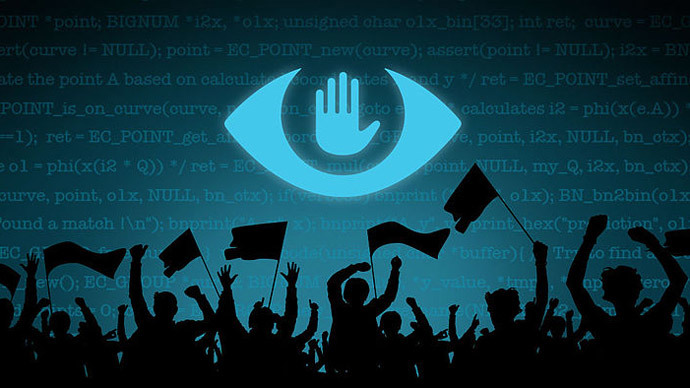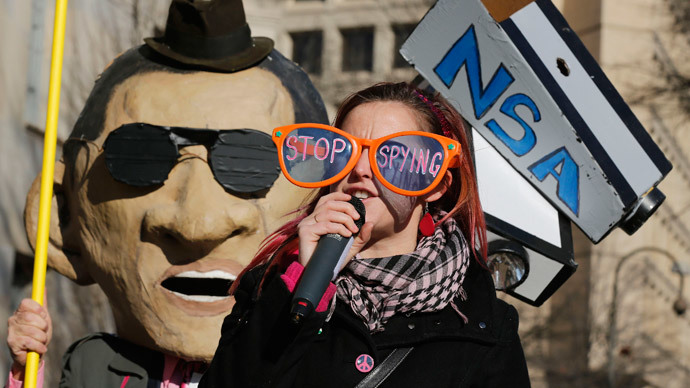Online revolts can stop govt: Yesterday we defeated SOPA, today we battle NSA

Properly mobilized people can become a massive online force capable of blocking ‘dangerous bills’ and changing government policies, Josh Levy of the Free Press told RT. The participants of The Day We Fight Back campaign say their call to action is simple.
RT:What are the protesters trying to achieve? How exactly are they supposed to 'fight back'?
Josh Levy: This day of action [Wednesday, February 11] is the next stop on the continuum of action that has taken place since Edward Snowden first revealed the extent of the NSA surveillance program back in June. It follows mass protests that took place in Washington DC in October, the huge online protest that took place in June after we’ve found out about all of these things. And what we have seen is that it has really changed the debate not only here in the US but around the world. And more and more people every day have turned away these programs and have tried to find the ways to stop them.
And the call to action today is actually very simple. Here in the US, we are asking for Congress to just support the USA Freedom Act, which would put a stop to one of the worst programs – which is the metadata phone collection program – that are collecting data on everybody who we call, where we call from and when we call; and that would make that gathering happen only when authorities have a warrant and would stop the blanket collection that is taking place right now.
RT:Well, Josh, your outlook here sound wildly optimistic, but I must ask you, how has online freedom legislation in the US actually changed, in the recent year or so?
JL: Well, today is right about the two-year anniversary of the SOPA/PIPA revolt that took place also online with a lot of the same organization getting involved, a lot of the same companies, more than 5,000 websites are participating today.
Woooo. 195,000 people worldwide signed the global petition. Help us get over 200,000. Privacy is a human right. https://t.co/WNmXPj1P8S
— TheDayWeFightBack (@DayWeFightBack) February 11, 2014
What we did back then, 2 years ago, we stopped SOPA and PIPA, which were these dangerous bills that would have allowed online censorship to take place in a rampant way. We stopped them dead cold in the House. People who were sponsoring those bills on Capitol Hill, suddenly announced on Twitter, that they were not sponsoring those Bills anymore, because they have been hearing from their constituents.

So we had learned a lot of lessons that day. What we learned is that when these terrible bills pop up, if you build enough of opposition online and offline, you really can stop them. More importantly if you drive all that attention to Capitol Hill, and you get thousands of phone calls going into Congress, you can actually make a difference. And that is what’s happening today. Today we had, I would say close to 100k phone calls going into Congress all day long. And I think these numbers are going to skyrocket.
Congress is getting over 7,000 calls an hour to #StopTheNSA. That's over 58,000 today. Awesome. Don't stop: https://t.co/o5uMRYBsRg
— TheDayWeFightBack (@DayWeFightBack) February 11, 2014
RT:With all this NSA snooping and the online actions, Josh, if you’ve got nothing to hide then why does everyone gets so upset about actually being watched?
JL: I think we have a lot to hide. I don’t see anybody advocating for the removal of curtains in everybody’s house because we have nothing to hide. I think that there’s an expectation of privacy here in the US and around the world that’s not being respected. And when that expectation is not respected, free speech suffers.
We are much less willing to speak our minds online or offline if we know we’re being watched, recorded and tracked. We’re much less willing to engage in political activism, to assemble, to organize ourselves for whatever causes we believe in, if we feel that authorities are watching our every move. And even if the authorities right now might not necessarily be antithetical to the things we believe in, may be the next president, the next government, the next congress will be, and they will be able to use all this data they’re collecting against us.

RT:What about some of the big internet companies out there? They have been working with the government to store your data and hand it over to the officials, so who is to blame here, is it the companies or some of those internet companies you’re working with?
JL: I think it is quite clear that government policies are the primary blame here. It’s the NSA collection activities that we are trying to stop. Now, you have some companies, you have telecommunication companies, that have been working very closely with the NSA to help handover our private data, and those practices also need to be stopped.
Some of those companies complain that they are just being compelled to do things that they don’t have any choice over, but we actually think that they probably could be raising more of a stink and making it more of an issue for the consumers.
Environmentalists care about spying because it's toxic for democracy. Thanks, @Greenpeace for helping! https://t.co/yrKnLg0Fob
— TheDayWeFightBack (@DayWeFightBack) February 11, 2014
When it comes to internet companies like Google, Facebook, Yahoo, others – they are in the practice, they are in the business of harvesting our data, and tracking everything that we do online as well. Now they do it in order to sell ads and make money off third party marketers. Now when they get compelled to hand over that data, that becomes a privacy problem for us no matter who’s got the data. I’m not ready to blame Google and all those other companies for being part of this problem. You’ll actually see that Google sent an email to more than a million of its own users, asking for them to take action today as well. But I do think there are questions to ask about their relationship between these big internet companies and government and what ramification for all of this data gathering may be.
RT:Do you believe in the Amendment of the Freedom of Speech, or is it just a bit of an illusion?
JL: I absolutely believe in it. And it’s not just an amendment here in the US, it is part of the UN’s declaration on human rights. It’s baked into our fundamental rights as far as we understand them everywhere. So yeah, I absolutely do believe in free speech. I think that it is number one thing we need to protect when we talk about democracy and individuality and protecting our right to connect and communicate in the 21 century.
Today has been so inspiring. Thanks to everyone worldwide who took action. Privacy is a human right. Together, we fight to protect it.
— TheDayWeFightBack (@DayWeFightBack) February 12, 2014
The statements, views and opinions expressed in this column are solely those of the author and do not necessarily represent those of RT.













